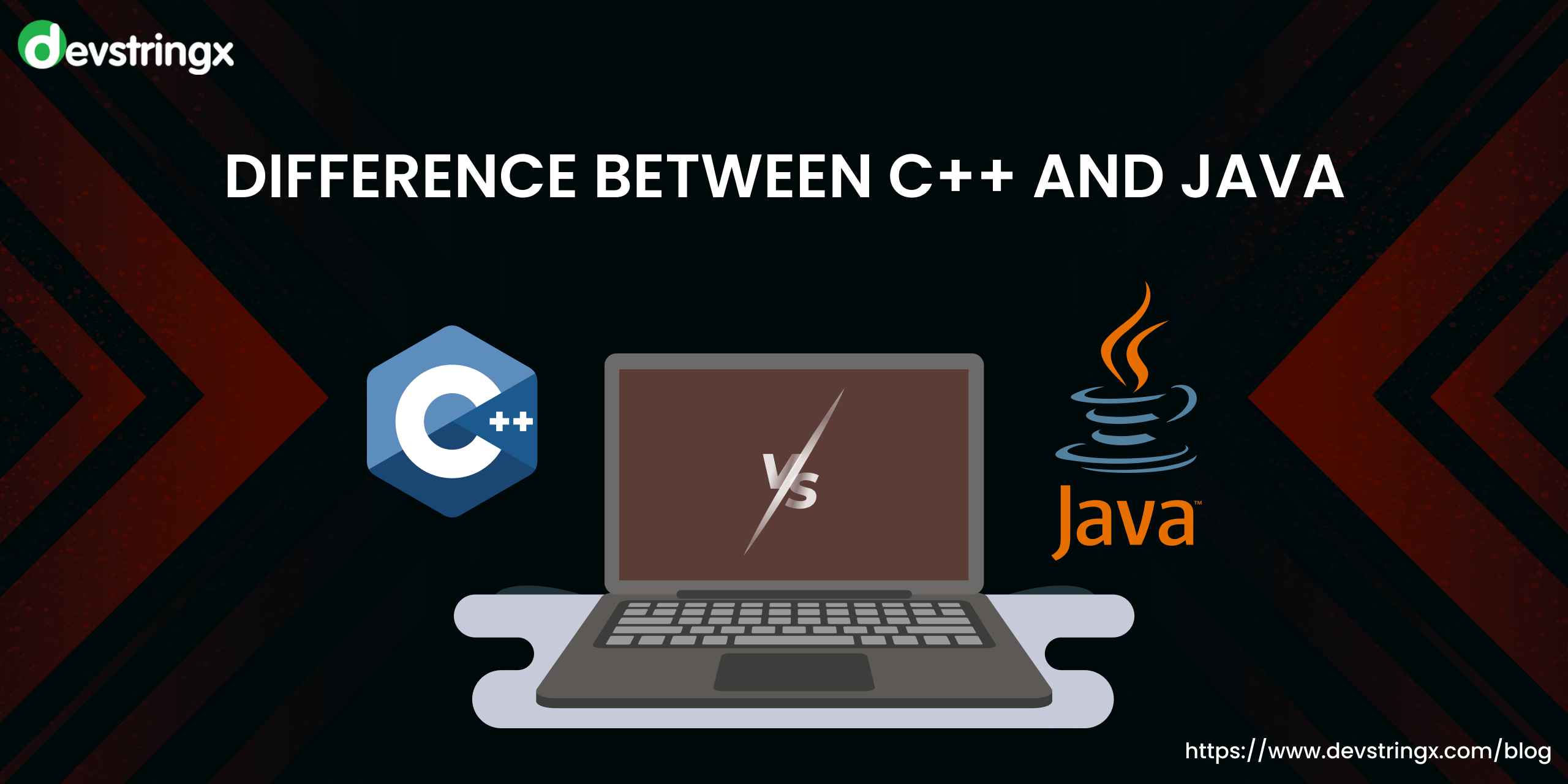Difference Between C++ and Java | C++ Vs Java – Devstringx
In the world of programming languages, two of the most commonly used are C++ and Java. Both languages have their strengths and weaknesses, making them ideal for different types of projects. Making the right choice between them can be critical in getting your project finished on time, with quality results. Here, We’ll discuss why you might choose one language over another based on your project requirements and goals. Read on to learn more about the differences between these two popular programming languages!
What Is C++?
C++ is an object-oriented programming language that was developed in the early 1980s. It was designed to be an extension of the programming language C, and it has since become one of the most popular languages for developing software.
C++ is used to develop a wide range of applications, including video games, desktop applications, mobile apps, and more. Unlike Java, which is also an object-oriented language, C++ allows developers to have more control over how their programs work. This can result in more efficient code, but it also means that C++ programs can be harder to debug.
What Is Java?
Java is a programming language and computing platform first released by Sun Microsystems in 1995. There are lots of applications and websites that will not work unless you have Java installed, and more are created every day. It’s also integral to the intranet applications and other e-business solutions that are the foundation of corporate computing.
In addition to its many uses, Java is fast, reliable, and secure. It is one of the most popular programming languages in use, particularly for client-server web applications, with nine million developers worldwide.
The Difference Between C++ and Java
C++ has multiple inheritances, while Java does not. This means that a C++ class can inherit from more than one base class, while a Java class can only inherit from one superclass.
C++ uses templates to allow generic programming, while Java uses generics to achieve the same goal. Templates are more powerful than generics, but they are also more complex to understand and use.
Java does not support operator overloading, while C++ does. This means that you cannot redefine the way an operator works for a specific data type in Java, but you can in C++.
C++ code is compiled into machine code and runs natively on the processor, while Java code is compiled into bytecode and runs on a virtual machine. This makes C++ faster and more efficient than Java.
Benefits of C++
- There are many benefits of using C++ over java. C++ is a much faster language, due to its compiled nature. This means that programs written in C++ can run significantly faster than those written in java.
- C++ also has a more powerful type system, which can allow for more precise code and fewer errors. Additionally, the C++ standard library provides a richer set of functions and data types than the Java equivalent.
- Overall, C++ is a more powerful and efficient language than java, making it a good choice for performance-critical applications.
Benefits of Java
- Java is a versatile and powerful programming language that enables developers to create robust, high-performance applications.
- The Java platform provides a complete set of development tools, which makes it easy for developers to create, debug, and deploy Java applications.
- Java is a cross-platform language, which means that applications written in Java can run on any platform that supports the Java platform.
- Java is secure, which makes it ideal for developing sensitive or mission-critical applications.
- Java is reliable, making it a good choice for developing large-scale enterprise applications.
Which Is Better to Use?
There are many differences between C++ and java, but which one is better to use? It depends on your goals and preferences as a programmer.
If you’re looking for a language that is closer to hardware and allows you to have more control over memory management, then C++ is a good choice. However, if you’re looking for a language that is easier to learn and use, then java might be a better option. Ultimately, it’s up to you to decide which language is best for your needs. both C++ and java have their advantages and disadvantages, so it’s important to choose the one that’s right for you.
There are many programming languages in existence today and two of the most popular are Java and C++. Both have their advantages and disadvantages, so it can be difficult to decide which one to use for your project. In this article, we’ll compare the two languages side-by-side to help you make a decision.
Java is a versatile language that can be used for a wide range of applications. It is easy to learn, has a well-defined set of rules, and runs on virtually any platform. However, Java can be slow and may not be suitable for resource-intensive tasks.
C++ is a powerful language that gives programmers more control over their code. It is faster than Java and can be used to create high-performance applications. However, C++ can be difficult to learn and is not as portable as Java.
So, which language should you use? The answer depends on your needs. If you want a versatile language that is easy to learn and runs on any platform, then Java is a good choice. If you need a powerful language for resource-intensive tasks, then C++ might be a better option.
Conclusion
In conclusion, there are many differences between C++ and Java that make them distinct from one another. While both of them have their benefits and drawbacks, they can be used for different purposes depending on your individual needs. C++ is a powerful language that allows you to create complex systems with greater control over the code structure while Java is great for creating user-friendly applications quickly with less coding required. Understanding the differences between these two languages will help you determine which one will best suit your programming needs.
Related Articles:-














